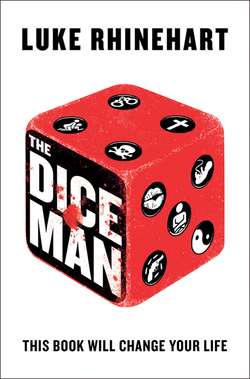Читать книгу The Dice Man - Luke Rhinehart - Страница 19
Chapter Ten
ОглавлениеBy training I have learned to look for the casual insignificance of every overt cause. In the morning, after a careless, buttockless period before breakfast, lukewarm coffee and Lil’s hungover imprecations, I wandered into the living room to recreate the scene of the crime. Pacing back and forth I tried to demonstrate to myself that I would have gone down to Arlene whether the die had been a one, a four, or a box of matches. I remained unconvinced. I knew in my big hard-pumping heart that only the die could have pushed me down those stairs and into Arlene’s entranceway.
I tried then to prove that I had seen the die that was on the side table before it had been covered with a card or at any rate before I made my solemn vow to commit holy rape if it turned out to have a one face up. I tried to determine who had left the card and die there and guessed it must have been Lil during her headlong flight to the bathroom. It seemed thus that I couldn’t have known that it was a one. Had I seen from the angle of my chair the sides of the die and thus unconsciously known that the die must have turned upward either a one or a six? I walked over to the little table and tumbled a die onto it and, without looking at what came face up, covered the die with the queen of spades more or less as it had been covered the night before. I went back and sat at the poker table. From there, staring through my glasses, squinting, straining, trying with superhuman effort, I managed to make out the table and the slightly humped playing card. If there was a die under the card it was unpublished news as far as my eyes were concerned. For me to have seen the die from my chair at the poker table I would have had to have an unconscious with telescopic sight. The case was clear: I couldn’t possibly have known what was under the queen of spades; my rape was determined by fate.
‘What happened to the picture of Freud?’ asked Lil, who had come in from the kitchen after turning the kids over to the maid.
Seeing that Freud’s portrait was still facing the wall, I said:
‘I don’t know. I assumed you did that last night as you went to bed. A symbolic rejection of me and my colleagues.’
Lil, her messed blonde hair, reddish eyes and uncertain frown making her look unusually like a mouse approaching cheese in a trap, looked at me suspiciously.
‘I did it?’ she asked, her mind stumbling over the events of last night.
‘Sure. Don’t you remember? You said something like “Now, Freud can look into the bowels of the house,” and staggered off to the john.’
‘I did not,’ she said. ‘I strode with great dignity.’
‘You’re right. You strode with great dignity in a variety of directions.’
‘But essentially I moved east.’
‘True.’
‘East and johnward.’
We laughed and I asked her to bring another cup of coffee and a doughnut to my study. Evie and Larry momentarily escaped from the clutches of the maid and swooped through the living room like two desperadoes shooting up a town and disappeared back toward the kitchen. I retreated to my home within my home: my old oaken desk in the study.
For a while I sat there throwing the two green dice across its scarred face and wondering what the events of the night before meant for me. My legs and loins felt heavy, my mind light. Last night I had done something I had vaguely felt like doing for two or three years. Having done it I was changed, not greatly, but changed. My life for a few weeks would be a little more complex, a little more exciting. Searching for a free hour to play with Arlene would while away time that in the recent past had been spent not being able to work on my book, not being able to concentrate on my cases and daydreaming about stock market coups. The time might not be better spent, but I would be better entertained. Thanks to the die.
What else might the dice dictate? Well, that I stop writing silly psychoanalytic articles; that I sell all my stock, or buy all I could afford; that I make love to Arlene in our double bed while my wife slept on the other side; that I take a trip to San Francisco, Hawaii, Peking; that I bluff every time when playing poker; that I give up my home, my friends, my profession. After giving up my psychiatric practice I might become a college professor … a stockbroker … a real estate salesman … Zen master … used-car salesman … travel agent … elevator man. My choice of profession seemed suddenly infinite. That I didn’t want to be a used-car salesman, didn’t respect the profession, seemed almost a limitation on my part, an idiosyncrasy.
My mind exploded with possibilities. The boredom I had been feeling for so long seemed unnecessary. I pictured myself saying after each random decision, ‘The die is cast,’ and sloshing stoically across some new, ever wider Rubicon. If one life was dead and boring, so what? Long live a new life!
But what new life? During the last months nothing had seemed worth doing. Had the die changed that? What specifically did I want to do? Well, nothing specific. But in general? All power to the dice! Good enough, but what might they decide? Everything.
Everything?
Everything.
